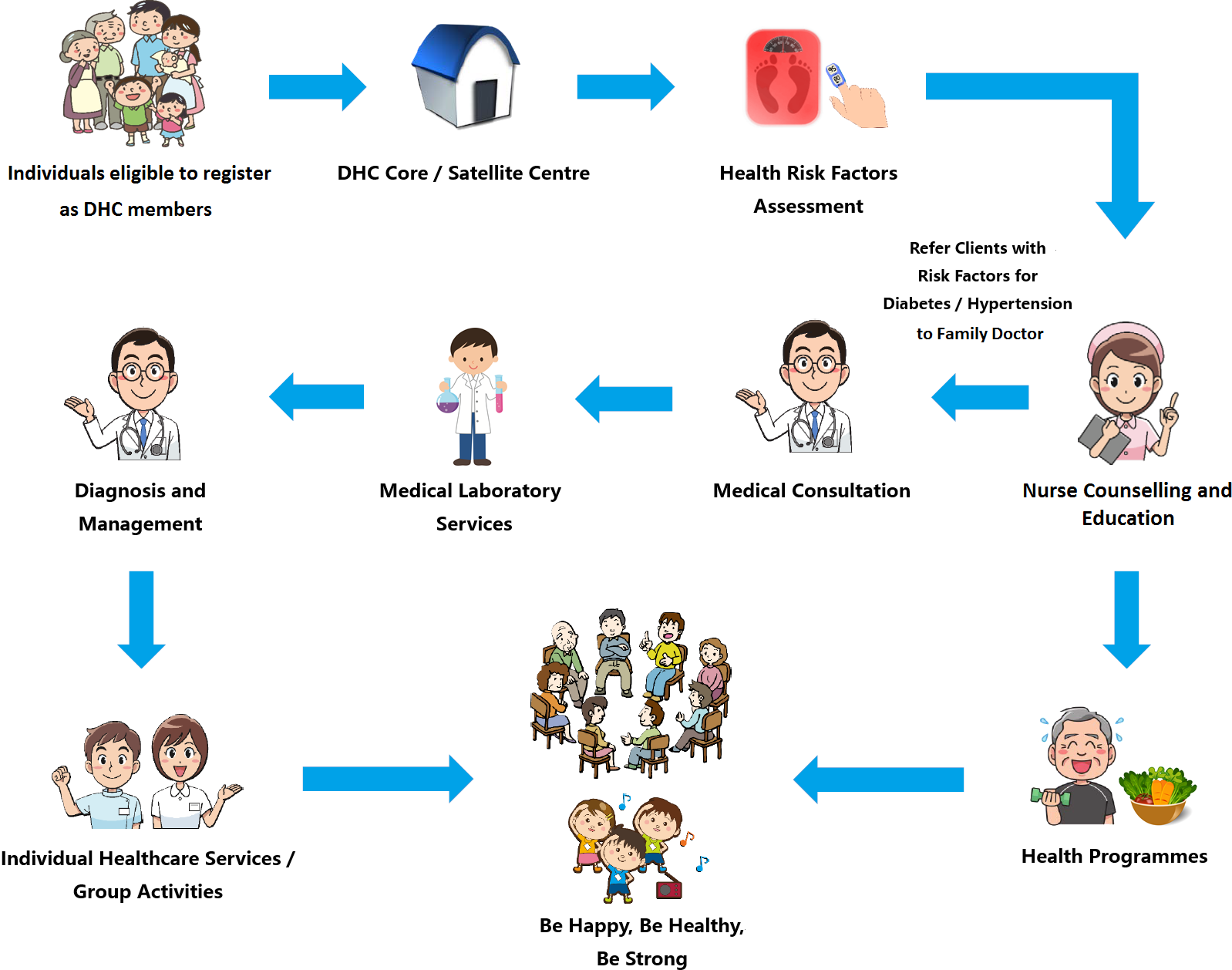Background
Who can register as a DHC member?
An individual who
- Is a holder of the Hong Kong Identity Card issued under the Registration of Persons Ordinance (Cap. 177, the Laws of Hong Kong) or the certificate of exemption, except those who obtained their Hong Kong Identity Cards by virtue of a previous permission to land or remain in Hong Kong granted to him and such permission has expired or ceased to be valid; or a child who is a Hong Kong resident and under 11 years of age;
- Agrees to enrol to eHealth;
To register for eHealth, press the following icon:

How can I enrol in DHC services?

Register at corresponding DHC

With referral
Client Journey

District Health Centres (DHC) & DHC Expresses
New Territories
Kowloon
Hong Kong
Useful information
FAQ
A1: The DHC is a primary healthcare initiative of the Government. Through public-private
partnership, medical-social collaboration, it provides district-based primary healthcare
services aiming to:
- enhance public awareness of disease prevention and their capability in self-management of health;
- drive healthy lifestyle for prevention of chronic disease;
- support the chronically ill to prevent deterioration; and
- enhance client access to primary healthcare services.
A2: Each DHC consists of a core centre and a few satellite centres, being the healthcare
service and resource hub of the district.
A3: The Government identifies a non-governmental organization through open tender.
A4: The core team of the DHC consists of nurses, a physiotherapist, an occupational
therapist, a dietitian, a pharmacist as well as social workers.
A1: An individual who
- is a holder of the Hong Kong Identity Card issued under the Registration of Persons Ordinance (Cap. 177, the Laws of Hong Kong) or the certificate of exemption, except those who obtained their Hong Kong Identity Cards by virtue of a previous permission to land or remain in Hong Kong granted to him and such permission has expired or ceased to be valid; or a child who is a Hong Kong resident and under 11 years of age; and
- agrees to enrol in the Electronic Health System (eHealth);
A1: Registration and membership are free. The membership is lifelong.
A2: Civil servants and Hospital Authority staff have to make the co-payment for DHC
services.
A3: Yes, healthcare service sessions are provided based on clinical needs, and the maximum
number of sessions for different DHC programmes has been set.
A4: Beyond the maximum number of subsidised sessions, the client has to pay the fees charged
by the Network Service Provider.
A5: Under the Scheme, the DHC client can receive subsidised healthcare professional services
for the targeted diseases within the scope as specified. Individual clients may receive
additional service(s) or treatment at their own expenses.
A6: Clients who have participated in the Elderly Health Care Voucher Scheme can pay for DHC
services from their Health Care Voucher accounts.
A7: Individual allied health services require medical referral from the Family Doctor.
Self-referral will be accepted for Chinese medicine services.
A8: Registration with the DHC Scheme is entirely voluntary. Clients who wish to withdraw
from the scheme can inform the DHC operator.
A9: Yes. Eligible clients are welcome to register as DHC member any time.
A1: To facilitate continuity of care, all DHC clients and Network Service Providers are
required to enrol in the eHealth. With prior consent from the client, clinical information
will be shared with the service providers through the eHealth, on a need-to-know basis.
A2: All DHC members must enrol in the eHealth. The DHC will not be able to provide a
coordinated service effectively to the client who withdraws from the eHealth. The client will
have to terminate his / her membership of the DHC Scheme.
For more FAQs on the eHealth, please click here.
